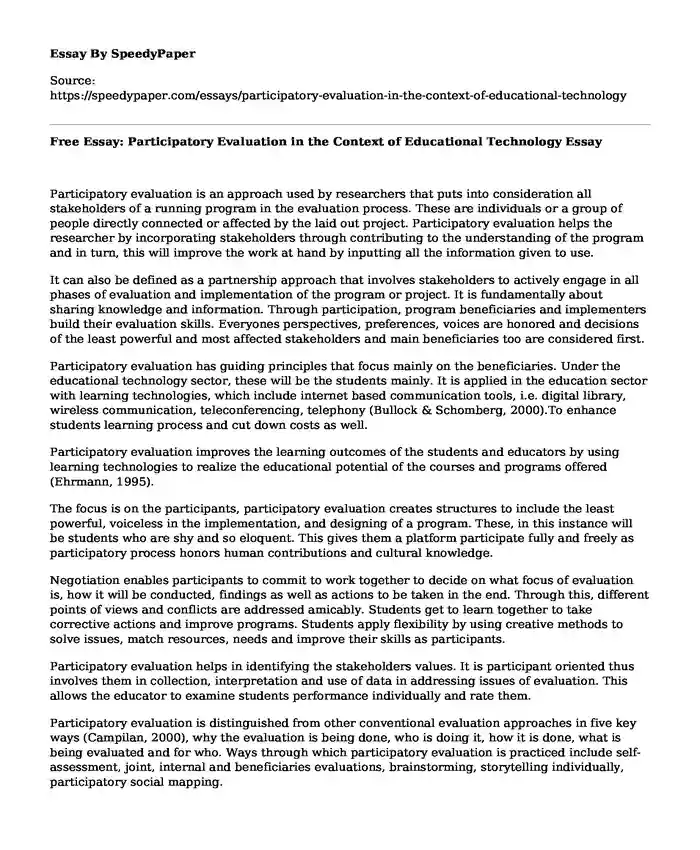
| Type of paper: | Essay |
| Categories: | Learning Education Technology |
| Pages: | 3 |
| Wordcount: | 705 words |
Participatory evaluation is an approach used by researchers that puts into consideration all stakeholders of a running program in the evaluation process. These are individuals or a group of people directly connected or affected by the laid out project. Participatory evaluation helps the researcher by incorporating stakeholders through contributing to the understanding of the program and in turn, this will improve the work at hand by inputting all the information given to use.
It can also be defined as a partnership approach that involves stakeholders to actively engage in all phases of evaluation and implementation of the program or project. It is fundamentally about sharing knowledge and information. Through participation, program beneficiaries and implementers build their evaluation skills. Everyones perspectives, preferences, voices are honored and decisions of the least powerful and most affected stakeholders and main beneficiaries too are considered first.
Participatory evaluation has guiding principles that focus mainly on the beneficiaries. Under the educational technology sector, these will be the students mainly. It is applied in the education sector with learning technologies, which include internet based communication tools, i.e. digital library, wireless communication, teleconferencing, telephony (Bullock & Schomberg, 2000).To enhance students learning process and cut down costs as well.
Participatory evaluation improves the learning outcomes of the students and educators by using learning technologies to realize the educational potential of the courses and programs offered (Ehrmann, 1995).
The focus is on the participants, participatory evaluation creates structures to include the least powerful, voiceless in the implementation, and designing of a program. These, in this instance will be students who are shy and so eloquent. This gives them a platform participate fully and freely as participatory process honors human contributions and cultural knowledge.
Negotiation enables participants to commit to work together to decide on what focus of evaluation is, how it will be conducted, findings as well as actions to be taken in the end. Through this, different points of views and conflicts are addressed amicably. Students get to learn together to take corrective actions and improve programs. Students apply flexibility by using creative methods to solve issues, match resources, needs and improve their skills as participants.
Participatory evaluation helps in identifying the stakeholders values. It is participant oriented thus involves them in collection, interpretation and use of data in addressing issues of evaluation. This allows the educator to examine students performance individually and rate them.
Participatory evaluation is distinguished from other conventional evaluation approaches in five key ways (Campilan, 2000), why the evaluation is being done, who is doing it, how it is done, what is being evaluated and for who. Ways through which participatory evaluation is practiced include self-assessment, joint, internal and beneficiaries evaluations, brainstorming, storytelling individually, participatory social mapping.
Methods recently embraced in the educational technology include influence improvement and evaluation use. This enables the educator to help enlighten the participants by improving their understanding of how the program works. This could be relating to students and the courses they are undertaking.
Another trend is stakeholder involvement, this appeal to the sense of ownership on the participants side. Under the educational technology, participant get involved in the evaluation process right from the collection and analysis of data, working through the information gathered to reach a conclusion and formulating recommendations through the learning of different courses. This empowers students with techniques that enables them yield better results for longer and improve their self-determination capacity.
Focusing on quality evaluation resulting to improved evidence. The evaluator should be competent in their field of operation or expertise to produce good quality and credible results in the students performance. Effective communication skills are needed especially in participatory evaluation because of the application of analytical techniques and listening skills. Participants will be freer to divulge information in such instances that they are being offered a platform to share without criticism.
References
Bullock, C. & Schomberg, S. (2002). Disseminating learning technologies across the faculty. International Journal Of Educational Technology, 2(1), 1-12.
Campilan, D. (2000). Participatory Evaluation of participatory research.Chambers, R (2009) Using participatory options for impact education in chambers: designing impact evaluations: different perspectives. New Delhi, India
Lorna, M.E (1995) Participatory evaluation in education studies of evaluation use and organizational learning. Routledge
Ehrmann, S.C (1995) asking the right questions, Change27 (2), 20-27
Cite this page
Free Essay: Participatory Evaluation in the Context of Educational Technology. (2019, Sep 03). Retrieved from https://speedypaper.com/essays/participatory-evaluation-in-the-context-of-educational-technology
Request Removal
If you are the original author of this essay and no longer wish to have it published on the SpeedyPaper website, please click below to request its removal:
- My Techniques and Tips to Making Oneself Study - Free Essay in Education
- Essay Example: Criminal Law Research
- Essay Example on the Cause of Inflation in Kenyan Economy
- Free Essay on Importance of Cultural Subtext
- Rhetorical Novel Comparison Essay, Free Example for Students
- Development Throughout the Lifespan, Free Essay Example
- Free Essay: Understanding Druids, Norse Believers, and Neopaganism: One-on-One Conversations
Popular categories




